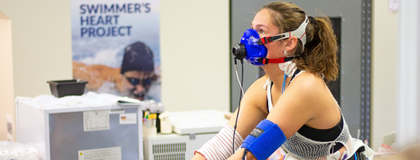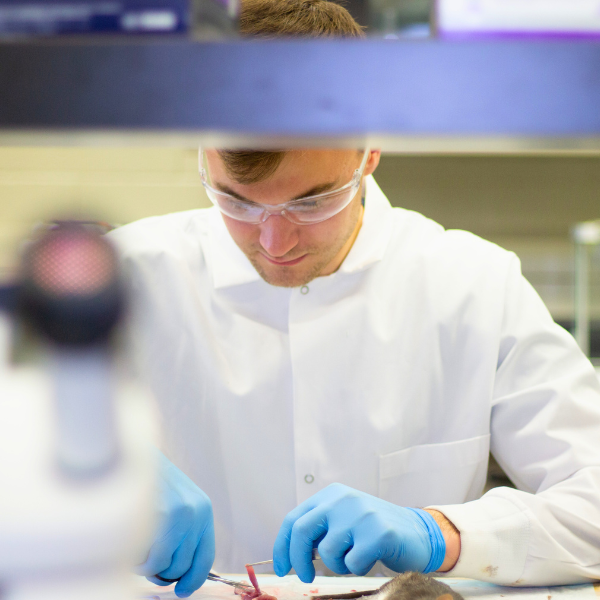
MSc Human Health and Nutritional Sciences
The Master of Science in Human Health and Nutritional Sciences focuses on physical activity and diet as powerful lifestyle determinants of human health. The interaction between genetics and environmental factors ultimately determines the health of an individual. Lifestyle is a major component of our environment that can be modified to affect human health.
The MSc program offers advanced experiential learning opportunities in nutritional and nutraceutical sciences, general and exercise physiology, and biomechanics, with a focus on lifestyle, genetics, and human health.
The program is ideal for those interested in aging, diabetes, obesity, cardiovascular disease, nutrition and exercise, biomechanics, metabolism, and neuroscience. Graduates end up careers in academia, industry, or professional practice, such as health care.

Degree Details
The Master of Science in Human Health and Nutritional Sciences is available as either a thesis (two-year program) or coursework and project (one-year program).
Students can choose one of three specializations:
- Biomechanics
- Nutrition, Exercise, and Metabolism
- Nutrition and Nutraceutical Sciences
Within the MSc thesis program, students must complete a minimum of 1.5 graduate credits and defend an acceptable thesis, which comprises an account of the student's research. Within the MSc coursework program, students must complete a minimum of 4.0 graduate credits, which include credits for research experience.

Collaborative Specializations
Master of Science in Human Health and Nutritional Science students may also add a collaborative specialization in Toxicology, Neuroscience or One Health. A collaborative specialization is an intra-university graduate field of study that provides an additional multidisciplinary experience for students enrolled in and completing the degree requirements for an HHNS graduate program.

Research Strengths
Human Health and Nutritional Sciences has more than 25 faculty members specializing in a variety of research areas. These efforts are focused on understanding the basic underlying biological aspects of health, at the level of the individual, not community or populations. Research efforts are underway to better understand aging, neurological/sensory disorders, osteoarthritis, and chronic diseases such as cancer, cardiovascular disease, obesity, and type II diabetes, among many other topics.
Hear from MSc HHNS Students
Choosing an Advisor
Check out Before You Apply for helpful advice on identifying and reaching out to faculty members.
- Review current graduate student opportunities in the Department of Human Health and Nutritional Sciences
- Visit our ReSearch CBS database to search by research topic.
- Visit the Graduate Faculty page for a full list of faculty members who work with graduate students.
To be considered, applicants must meet the requirements of a four-year honours science degree with a minimum 75% average during the final two years or four semesters of undergraduate study (learn how to calculate your admission average). Applicants should have completed a course in statistics. Each applicant must obtain the support of a faculty member willing to serve as their advisor in either the thesis or coursework program stream, and prior to submitting an application.
Admission may be granted in September, January, or May. Completed applications should be uploaded at least one full semester (four months) before the expected date of admission. Applications from international students should be uploaded six to nine months prior to the expected date of admission.
All components of the application, including transcript(s), graduate certificate(s), grading scale(s), English Language Proficiency tests, assessment forms, a statement of interest and the name of the faculty advisor must be uploaded no later than two months after an application is submitted through the OUAC portal. Applications that are incomplete after this time period will be closed.
Potential graduate students should contact faculty members who share their research interests before completing and submitting an official application form.
To assist our faculty in making a selection from the pool of interested students, we suggest you include a statement, which contains the following:
- Courses completed (plus the mark received)
- Relevant research and/or work experience you have, and with whom
- Whether you have a scholarship
- Two to three academic or research references
- The reason for contacting that particular faculty member
You should be aware that students with insufficient command of the English language may not qualify for a Teaching Assistantship.
Graduate student applications to programs in the College of Biological Science are handled by the Office of the Associate Dean, Research (ADR). Before submitting an application, applicants are strongly encouraged to review the information found on the CBS-ADR website to learn more about the application process and how to fund your studies.
Complete application submission instructions may also be found on the Office of Graduate Studies webpage or in the Graduate Calendar.
Contact Us:
Dr. Stephen Brown, Graduate Program Coordinator
519-824-4120 ext. 53651
shmbrown@uoguelph.ca
Mira Jashari, Graduate Program Assistant
519-824-4120 ext. 56356
fjashari@uoguelph.ca
Karen White, Graduate Admissions Assistant
519-824-4120 ext. 52730
cbsgrad@uoguelph.ca















